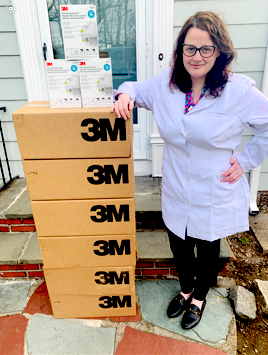Meredith Arden traveled around Rhode Island, Massachusetts to secure donations
A University of Rhode Island College of Nursing student has made an extraordinary effort to help during the COVID-19 crisis, collecting more than 5,000 medical grade masks from companies around Rhode Island and Massachusetts, and delivering them directly to front-line medical workers who need them most.
Meredith Arden, a student in the College’s Psychiatric Mental Health Nurse Practitioner program, recognized early on in the coronavirus outbreak that personal protective equipment could be in short supply for frontline medical workers like her and her fellow nurses at Eleanor Slater Hospital in Cranston. So when she saw an opportunity to help alleviate the shortage, she jumped at it.
In early March, as the virus’ effect on the United States was becoming more widespread, Arden gave a presentation on infection control to employees at SSTARbirth Addiction Treatment in Cranston, during which she passed out hand sanitizer she had bought before store shelves began to empty. The facility told her they were having difficulty finding medical grade masks, so she promised to try to help.
“That night I went to dinner and I was talking about how I could get ahold of some masks for them,” Arden said. “A gentleman happened to overhear me saying I needed them, and he came up to me and said he could get them for me. He knows someone who owns a shipyard who can help.”
A couple days later, Arden drove to the shipyard and met with the owner, who wishes to remain anonymous. He handed her a case of N-95 masks that were more than enough to supply SSTAR. And he wasn’t done. After Arden assured him they would go directly to frontline medical workers, he began calling colleagues in other construction and transportation companies, who agreed to donate extra masks.
Arden spent the next couple weeks driving all around Rhode Island and Massachusetts, traveling as far as Springfield and Chelmsford, filling her car with boxes of masks desperately needed at medical facilities. She collected more than 5,000 N-95 masks, which she donated directly to nurses and doctors at federally qualified hospitals, community medical centers, nursing homes and hospice centers around the state. The direct distribution to front-line workers was key in securing so many masks, she said.
“In some facilities, supplies like masks are distributed around and they don’t always get to the people actually working with patients,” Arden said. “They weren’t going to donate them unless they got to the people who really need them. I contacted individual nurse managers and made sure they went right to the people who need them. Some of the companies had been contacted to donate, but they gave them to me because I went to talk to them and assured them where the masks would end up.”
Arden continues to collect N-95 masks to donate, and recently received another 12 cases from a company that contacted her a second time after a delayed shipment came through. Other companies that did not have masks contributed cleaning supplies, gloves and face shields, all of which have been donated.
“I will take donations from anyone willing to donate to frontline workers, and I can make sure they get to people who really need them,” Arden said. “If you see a need and you can meet that need, that’s what humanity is all about. If there’s a way we can help and be humans, we have to find it in ourselves to make the biggest impact we can. I was glad I was able to help. The companies really stepped up; everyone really stepped up. It instills hope that even in these tenuous times, there are a lot of really wonderful people out there.”
Anyone interested in donating can contact Arden at marden@my.uri.edu.

